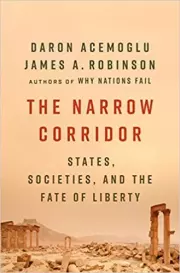Daron Acemoglu - The Narrow Corridor: States, Societies, and the Fate of Liberty
 | Название: | The Narrow Corridor: States, Societies, and the Fate of Liberty |
Автор: | Daron Acemoglu | |
Жанр: | Старинная литература | |
Изадано в серии: | неизвестно | |
Издательство: | неизвестно | |
Год издания: | 2019 | |
ISBN: | неизвестно | |
Отзывы: | Комментировать | |
Рейтинг: | ||
Поделись книгой с друзьями! Помощь сайту: донат на оплату сервера | ||
Краткое содержание книги "The Narrow Corridor: States, Societies, and the Fate of Liberty"
From the authors of the international bestseller Why Nations Fail, a crucial new big-picture framework that answers the question of how liberty flourishes in some states but falls to authoritarianism or anarchy in others--and explains how it can continue to thrive despite new threats.
In Why Nations Fail, Daron Acemoglu and James A. Robinson argued that countries rise and fall based not on culture, geography, or chance, but on the power of their institutions. In their new book, they build a new theory about liberty and how to achieve it, drawing a wealth of evidence from both current affairs and disparate threads of world history.
Liberty is hardly the "natural" order of things. In most places and at most times, the strong have dominated the weak and human freedom has been quashed by force or by customs and norms. Either states have been too weak to protect individuals from these threats, or states have been too strong for people to protect themselves from despotism. Liberty emerges only when a delicate and precarious balance is struck between state and society.
There is a Western myth that political liberty is a durable construct, arrived at by a process of "enlightenment." This static view is a fantasy, the authors argue. In reality, the corridor to liberty is narrow and stays open only via a fundamental and incessant struggle between state and society: The authors look to the American Civil Rights Movement, Europe’s early and recent history, the Zapotec civilization circa 500 BCE, and Lagos’s efforts to uproot corruption and institute government accountability to illustrate what it takes to get and stay in the corridor. But they also examine Chinese imperial history, colonialism in the Pacific, India’s caste system, Saudi Arabia’s suffocating cage of norms, and the “Paper Leviathan” of many Latin American and African nations to show how countries can drift away from it, and explain the feedback loops that make liberty harder to achieve.
Today we are in the midst of a time of wrenching destabilization. We need liberty more than ever, and yet the corridor to liberty is becoming narrower and more treacherous. The danger on the horizon is not "just" the loss of our political freedom, however grim that is in itself; it is also the disintegration of the prosperity and safety that critically depend on liberty. The opposite of the corridor of liberty is the road to ruin.
Читаем онлайн "The Narrow Corridor: States, Societies, and the Fate of Liberty". Главная страница.
- 1
- 2
- 3
- . . .
- последняя (197) »
Also by Daron Acemoglu and James A. Robinson
Why Nations Fail
Economic Origins of Dictatorship and Democracy
PENGUIN PRESS
An imprint of Penguin Random House LLC
penguinrandomhouse.com
Copyright © 2019 by Daron Acemoglu and James A. Robinson
Penguin supports copyright. Copyright fuels creativity, encourages diverse voices, promotes free speech, and creates a vibrant culture. Thank you for buying an authorized edition of this book and for complying with copyright laws by not reproducing, scanning, or distributing any part of it in any form without permission. You are supporting writers and allowing Penguin to continue to publish books for every reader.
This page constitutes an extension of this copyright page.
Picture research by Toby Greenberg Maps prepared by Carlos Molina and Jose Ignacio Velarde Morales
LIBRARY OF CONGRESS CATALOGING-IN-PUBLICATION DATA
Names: Acemoglu, Daron, author. | Robinson, James A., 1960– author.
Title: The narrow corridor: states, societies, and the fate of liberty / Daron Acemoglu and James A. Robinson.
Description: New York : Penguin Press, 2019. | Includes bibliographical references and index.
Identifiers: LCCN 2019009146 (print) | LCCN 2019981140 (ebook) | ISBN 9780735224384 (hardcover) | ISBN 9780735224391 (ebook) | ISBN 9781984879189 (international/export)
Subjects: LCSH: Liberty. | State, The. | Power (Social sciences)—Political aspects. | Direct democracy. | Decentralization in government. | Executive power. | Violence—Political aspects.
Classification: LCC JC585 .A188 2019 (print) | LCC JC585 (ebook) | DDC 320.01/1—dc23
LC record available at https://lccn.loc.gov/2019009146
LC ebook record available at https://lccn.loc.gov/2019981140
While the authors have made every effort to provide accurate Internet addresses at the time of publication, neither the publisher nor the authors assume any responsibility for errors, or for changes that occur after publication. Further, the publisher does not have any control over and does not assume any responsibility for author or third-party websites or their content.
Cover design: Christopher Brian King
Cover photograph: Joe and Clair Carnegie Libyan Soup Getty Images
Version_2
To Arda and Aras, even if this is much less than I owe you. —DA
Para Adrián y Tulio. Para mí el pasado, para ustedes el futuro. —JR
CONTENTS
Also by Daron Acemoglu and James A. Robinson
Title Page
Copyright
Dedication
Preface
Chapter 1 HOW DOES HISTORY END?
Chapter 2 THE RED QUEEN
Chapter 3 WILL TO POWER
Chapter 4 ECONOMICS OUTSIDE THE CORRIDOR
Chapter 5 ALLEGORY OF GOOD GOVERNMENT
Chapter 6 THE EUROPEAN SCISSORS
Chapter 7 MANDATE OF HEAVEN
Chapter 8 BROKEN RED QUEEN
Chapter 9 DEVIL IN THE DETAILS
Chapter 10 WHAT’S THE MATTER WITH FERGUSON?
Chapter 11 THE PAPER LEVIATHAN
Chapter 12 WAHHAB’S CHILDREN
Chapter 13 RED QUEEN OUT OF CONTROL
Chapter 14 INTO THE CORRIDOR
Chapter 15 LIVING WITH THE LEVIATHAN
Photographs
Acknowledgments
Bibliographic Essay
Sources for Maps
References
Photograph Credits
Index
About the Authors
PREFACE
Liberty
This book is about liberty, and how and why human societies have achieved or failed to achieve it. It is also about the consequences of this, especially for prosperity. Our definition follows the English philosopher John Locke, who argued that people have liberty when they have
perfect freedom to order their actions and dispose of their possessions and persons, as they think fit … without asking leave, or depending upon the will of any other man.
Liberty in this sense is a basic aspiration of all human beings. Locke emphasized that
no one ought to harm another in his life, health, liberty, or possessions.
Yet it is clear that liberty has been rare in history and is rare today. Every year millions of people in the Middle East, Africa, Asia, and Central America flee their homes and risk life and limb in the process, not because they are seeking higher incomes or greater material comfort, but because they are trying to protect themselves and their families from violence and fear.
Philosophers have proposed many definitions of liberty. But at the most fundamental level, as Locke recognized, liberty must start with people being free from violence, intimidation, and other demeaning acts. People must be able to make free choices about their lives and have the means to carry them out without the menace of unreasonable punishment or draconian social sanctions.
All the Evil in the World
In January 2011 in the Hareeqa market in the old city of Damascus, Syria, a spontaneous protest took place against the despotic regime of Bashar al-Assad. Soon afterward in the southern city of Daraa some children wrote “The people want the fall of the government” on a wall. They were arrested and tortured. A crowd gathered to demand their release, and two people were killed by the police. A mass demonstration erupted that soon spread throughout the country. A lot of the people, it turned out, did want the government to fall. A civil war soon broke out. The state, its military, and its security forces duly disappeared from much of the country. But instead of liberty, Syrians ended up with civil war and uncontrolled violence.
Adam, a media organizer in Latakia, reflected on what happened next:
We thought we’d get a present, and what we got was all the evil in the world.
Husayn, a playwright from Aleppo, summed it up:
We never expected that these dark groups would come into Syria—the ones that have taken over the game now.
Foremost among these “dark groups” was the so-called Islamic State, or what was then known as ISIS, which aimed to create a new “Islamic caliphate.” In 2014, ISIS took control of the major Syrian city of Raqqa. On the other side of the border in Iraq, they captured the cities of Fallujah, Ramadi, and the historic city of Mosul with its 1.5 million inhabitants. ISIS and many other armed groups filled the stateless void left by the collapse of the Syrian and Iraqi governments with unimaginable cruelty. Beatings, beheadings, and mutilations became commonplace. Abu Firas, a fighter with the Free Syrian Army, described the “new normal” in Syria:
It’s been so long since I heard that someone died from natural causes. In the beginning, one or two people would get killed. Then twenty. Then fifty. Then it became normal. If we lost fifty people, we thought, “Thank God, it’s only fifty!” I can’t sleep without the sound of bombs or bullets. It’s like something is
--">- 1
- 2
- 3
- . . .
- последняя (197) »


